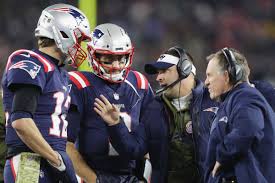The New England Patriots entered the 2024 season with cautious optimism after making offseason moves aimed at jumpstarting a sluggish offense. However, by the midpoint of the season, it became evident that the same core issues persisted. The offense remained stagnant, predictable, and inefficient, ranking near the bottom of the league in points scored, total yards, and third-down conversions. Whether it was poor quarterback play, a lack of separation from receivers, or subpar offensive line performance, the unit simply couldn’t generate sustained drives or explosive plays.
Quarterback play was perhaps the most glaring weakness. Neither Mac Jones nor any potential replacement could consistently elevate the offense or protect the football. Despite some promising moments, inconsistency and turnovers plagued the position all year long. New England’s passing attack lacked rhythm, and the inability to stretch the field vertically allowed defenses to stack the box and neutralize a run game that struggled to find momentum. Wide receivers failed to win one-on-one matchups, and no true No. 1 option emerged.
The offensive line, a longtime strength during the Patriots’ dynasty years, became a liability. Injuries, youth, and a lack of cohesion up front led to frequent pressure on the quarterback and limited running lanes. Offensive coordinator changes or tweaks to the scheme yielded few results, and the Patriots found themselves repeating the same mistakes weekly. Even when the defense held opponents to modest point totals, the offense simply couldn’t take advantage of favorable field position or capitalize on key opportunities.
By season’s end, the lack of growth prompted serious reflection within the organization. Head coach Jerod Mayo, in his first year succeeding Bill Belichick, was left to make tough decisions about the offensive staff. Changes were inevitable. The team parted ways with its offensive coordinator and began an aggressive search for a modern, quarterback-friendly mind to lead the offense into a new era. The question of whether to draft a new franchise quarterback became central to the offseason narrative.
Ownership and the front office began to acknowledge that a long-term rebuild might be necessary. The Patriots—once synonymous with Super Bowl success—were now several years removed from contention and lacked cornerstone offensive players. With a likely top-five draft pick, New England began evaluating its options: find a new quarterback, invest in elite wide receiver talent, and rebuild the offensive line from the ground up. The goal is no longer short-term fixes—it’s about building a sustainable, dynamic offense for the next generation.
The fanbase, spoiled by two decades of dominance, now finds itself in unfamiliar territory. Patience is being tested, but there’s a growing consensus that the franchise must fully embrace a modern offensive philosophy and reset the roster with younger, more explosive talent. The 2024 season served as a painful but necessary reality check. If New England is to return to relevance in a competitive AFC, the changes ahead must be bold, strategic, and future-focused.

